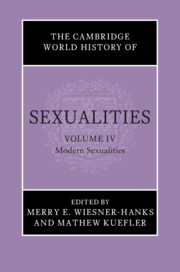Book contents
- The Cambridge World History of Sexualities
- The Cambridge World History of Sexualities
- The Cambridge World History of Sexualities
- Copyright page
- Contents
- Figures in Volume IV
- Contributors to Volume IV
- Editors’ Preface to the Series
- 1 Sexuality and Capitalism
- 2 Colonialism and Modern Sexuality
- 3 Gender, Migration, and Sexuality in the Modern World
- 4 ‘Pornography’, ‘Obscenity’, and the Suppression of Libertine Literature
- 5 Sexuality and the Print Media in the Modern World
- 6 Eugenics, Public Health, and Modern Sexuality
- 7 Sexuality and Consumerism in the Modern World: The Business of Pleasure
- 8 Sex Education in the Modern World
- 9 Birth Control and Reproductive Rights in the Modern World
- 10 The Impact of the World Wars on Modern Sexuality
- 11 Sexualities and Dictatorships of the Twentieth Century
- 12 Sexuality in Post-war Liberal Democracies
- 13 The Sexual Revolution
- 14 Sex Tourism: Fluid Borders of Meanings and Practices
- 15 The History of AIDS since 1981: Medicine, Politics, and Societies in a Pandemic
- 16 Sex Trafficking in the Modern World
- 17 Sex, Law, and Domestic Violence against Women in the Modern World
- 18 Sexuality under Attack Now
- Index
- Contents to Volumes I, II, and III
- References
9 - Birth Control and Reproductive Rights in the Modern World
Published online by Cambridge University Press: 26 April 2024
- The Cambridge World History of Sexualities
- The Cambridge World History of Sexualities
- The Cambridge World History of Sexualities
- Copyright page
- Contents
- Figures in Volume IV
- Contributors to Volume IV
- Editors’ Preface to the Series
- 1 Sexuality and Capitalism
- 2 Colonialism and Modern Sexuality
- 3 Gender, Migration, and Sexuality in the Modern World
- 4 ‘Pornography’, ‘Obscenity’, and the Suppression of Libertine Literature
- 5 Sexuality and the Print Media in the Modern World
- 6 Eugenics, Public Health, and Modern Sexuality
- 7 Sexuality and Consumerism in the Modern World: The Business of Pleasure
- 8 Sex Education in the Modern World
- 9 Birth Control and Reproductive Rights in the Modern World
- 10 The Impact of the World Wars on Modern Sexuality
- 11 Sexualities and Dictatorships of the Twentieth Century
- 12 Sexuality in Post-war Liberal Democracies
- 13 The Sexual Revolution
- 14 Sex Tourism: Fluid Borders of Meanings and Practices
- 15 The History of AIDS since 1981: Medicine, Politics, and Societies in a Pandemic
- 16 Sex Trafficking in the Modern World
- 17 Sex, Law, and Domestic Violence against Women in the Modern World
- 18 Sexuality under Attack Now
- Index
- Contents to Volumes I, II, and III
- References
Summary
This chapter attempts to explore global trajectories of birth control, family planning, and reproductive health and rights discourses in the modern world by comparing experiences of countries in the Global South with the Global North. Women all over the world have long had some control over their reproductive bodies. “Planning” became a very crucial concept within the global development discourse put forward during the post Second World War. One of the main resources that needed to be planned was population, thus “family planning” emerged as a novel form of population control. This ideology was supported by philanthropic institutions such as the Rockefeller Foundation and the International Planned Parenthood Federation, and by international conferences on population and development. Sri Lanka was a colony of the Western powers for four centuries (1505-1948), then a development “model” for South Asia in the 1970s, then the site of a civil war (1983-2009). Sri Lanka offers a more inclusive conceptual framework to understand how policy decisions taken in the Global North fails to have the same impact in the Global South. This chapter shows how policies must adapt to the local realities of the Global South irrespective of ratifying global population and development conventions.
Keywords
- Type
- Chapter
- Information
- The Cambridge World History of Sexualities , pp. 183 - 203Publisher: Cambridge University PressPrint publication year: 2024

